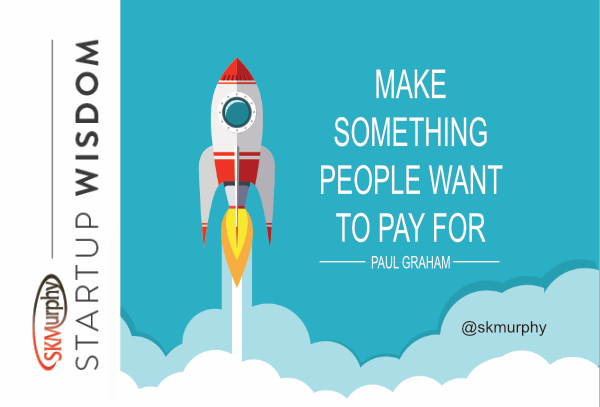Quotes for entrepreneurs curated in August 2022 on the themes of maturing, the value of a sense of history, and the value of a long term perspective
Quotes For Entrepreneurs Curated in August 2022
I curate these quotes for entrepreneurs from a variety of sources and tweet them on @skmurphy about once a day where you can get them hot off the mojo wire. At the end of each month I curate them in a blog post that adds commentary and may contain a longer passage from the same source for context. Please enter your E-mail address if you would like to have new blog posts sent to you.
Themes for this month: maturing, the value of a sense of history, and the value of a long term perspective.
+ + +
“The longer the time frame for results, the less you need intensity and the more you need consistency.”
Share Parrish
+ + +

“Make Something People Want to Pay For.”
Paul Graham
Technically Graham says “Make Something People Want” in his 2008 essay “Be Good.” He goes on to acknowledge, “Make something people want. Don’t worry too much about making money. What you’ve got is a description of a charity.” So this is the “bootstrapper version” as suggested by Scotty79 on HN
I think it’s fine motto for startups that are going to be fueled with angel money.
For bootstrapped startups I think it should be: “Make something people want (to pay for!).”
Scotty79 in https://news.ycombinator.com/item?id=21948336
In a 2020 tweet Graham explained that,”Make something people want” is fundamentally advice about being empirical, instead of assuming you already have all the answers.”
+ + +
“Redfield project: a brownfield project littered with the corpses of those who previously failed at the attempt.”
Lorin Hochstein (@NoRootCause)
Graveyard – an apparent greenfield area covering the buried corpses of people who did not do their homework.
If two hours in the library can save two weeks in the lab, a “Picnic in the Graveyard” can keep you above the grass.
+ + +
“Wisdom is the great consolation prize.”
Aaron Haspel in “Everything“
+ + +
“I think the modern web took a wrong turn on its evolutionary path and that we should resurrect ideas from the earlier days of computing — less centralization, software that’s harder to learn but more powerful, and wider technical literacy.”
Brandur Leach (@brandur) in Github Profile
+ + +
“There are moments that the words don’t reach
There is suffering too terrible to name
You hold your child as tight as you can
And push away the unimaginable.”
Lin Manuel Miranda in “It’s Quiet Uptown“
I was listening to this song today reminded of John Foster McKenna who passed away 8 years ago in August. See John Foster McKenna 1990-2014 and Good Fortune.
+ + +


“I never dreamed that one day I’d become a grumpy old man, but here I am, killing it.”
+ + +
Built in the Fifties, original and unrestored, some parts still in working order.
+ + +
“The art of meditation is a way of getting in touch with reality. And the reason for it is that most civilized people are out of touch with reality because they confuse the world as it is with the world as they think about it and talk about it and describe it. For on the one hand, there is the real world, and on the other a whole system of symbols about that world which we have in our minds. These are very, very useful symbols, all civilization depends on them, but like all good things, they have their disadvantages and the principal disadvantage of symbols is that we confuse them with reality. Just as we confuse money with actual wealth. And our names about ourselves our ideas of ourselves images of ourselves, with ourselves.
Alan Watts on “2.5.4 Meditation“
+ + +
“The feeling of being just a breath ahead of calamity. Growing up means moving ever more deeply into the awareness of contingency. Former ignorance was bliss.”
Sven Birkerts (@svenbirkerts)
I used this in Insights on Memory and Mortality from Sven Birkerts
+ + +
“If X% of a population of Y need to do Z you need to sample 1000 / X to get statistically valid evidence. You can’t say you are taking a calculated risk unless you made some calculations.”
Alberto Savoia (@Pretotyping) in “The Alpha Product Manager: Optimal Sample Size“
+ + +
“When a man begins to take reunions seriously he is getting old.”
William Feather
I am not sure about this one, I took my high school seriously for ten years because it was a small class and it was good to compare notes on all of the changes we were experiencing.
+ + +
“It is not your business to succeed, but to do right; when you have done so, the rest lies with God.”
C.S. Lewis
h/t CS Lewis Daily via April K. Mills (@engineforchange)
+ + +
“Three sides of risk:
- the odds you will get hit
- average consequences of getting hit
- tail-end consequences of getting hit
The first two are easy to grasp. It’s the third that’s hardest to learn and can often only be learned through experience.”
Morgan Housel “Three Sides of Risk“
The more history you can access, the greater appreciation for what the tail-end consequences can look like.
+ + +
“It’s hard to feel middle-aged, because how can you tell how long you are going to live?”
Mignon Mclaughlin
+ + +
“To grow old is more difficult than to die, because to renounce a good once and for all, costs less than to renew the sacrifice day by day and in detail. To bear with one’s own decay, to accept one’s own lessening capacity, is a harder and rarer virtue than to face death.”
Henri Frederic Amiel in his Journal
+ + +
Rusty, Bent, Old Tools
“It’s funny: I always imagined when I was a kid that adults had some kind of inner toolbox full of shiny tools: the saw of discernment, the hammer of wisdom, the sandpaper of patience. But then when I grew up I found that life handed you these rusty bent old tools–friendships, prayer, conscience, honesty–and said ‘do the best you can with these, they will have to do’. And mostly, against all odds, they do.”
Anne Lamott “Traveling Mercies: Some Thoughts on Faith“
+ + +
“Mistakes become very hard to fix once they’re embodied in jobs. The people whose jobs they are become highly motivated advocates for the continuance of the mistake.”
Paul Graham (@paulg)
At scale, jobs become hierarchies that transform into bureaucracies or rackets. This is also why charities and government agencies never solve the problems that drive their funding. Drucker’s organized abandonment model is a good antidote for businesses to mitigate this evolution. Jobs-at-scale is also part of the basis for Cardwell’s Law and why the status quo is such a fierce competitor: many people have a stake in current practices, no matter the side effects or shortcomings. Related
- Joel Mokyr on Creative Forces and Cardwell’s Law
- Discovery, Invention, Growth, and Renewal
- Andrew Grove on Recognizing Reality
+ + +
“If you ask my eight-year-old about the Future, he pretty much thinks the world is going to end, and that’s it. Most likely global warming, he says—floods, storms, desertification—but the possibility of viral pandemic, meteor impact, or some kind of nuclear exchange is not alien to his view of the days to come. Maybe not tomorrow, or a year from now. The kid is more than capable of generating a full head of optimistic steam about next week, next vacation, his tenth birthday. It’s only the world a hundred years on that leaves his hopes a blank. My son seems to take the end of everything, of all human endeavor and creation, for granted. He sees himself as living on the last page, if not in the last paragraph, of a long, strange and bewildering book. If you had told me, when I was eight, that a little kid of the future would feel that way—and that what’s more, he would see a certain justice in our eventual extinction, would think the world was better off without human beings in it—that would have been even worse than hearing that in 2006 there are no hydroponic megafarms, no human colonies on Mars, no personal jetpacks for everyone. That would truly have broken my heart.
This reminds me of a quote I curated in April 2013:
“Beware how you take away hope from any human being.”
Oliver Wendell Holmes, Sr. in his valedictory address to medical graduates at Harvard University (10 March 1858)
+ + +
“It is important to remember when starting and growing a new company that cash is more important than your mother”
Alan Shugart (from Computer History Museum bio)
+ + +
“There is small risk a general will be regarded with contempt by those he leads, if, whatever he may have to preach, he shows himself best able to perform.”
Xenephon in “The Cavalry General” , ch. 6, as translated by Henry Graham Dakyns [Gutenberg]
This is part of a section of leadership advice based on careful observation (short passage above rendered to bold for context):
But, after all, no man, however great his plastic skill, can hope to mold and shape a work of art to suit his fancy, unless the stuff on which he works be first prepared and made ready to obey the craftsman’s will. Nor certainly where the raw material consists of men, will you succeed, unless, under God’s blessing, these same men have been prepared and made ready to meet their officer in a friendly spirit. They must come to look upon him as of greater sagacity than themselves in all that concerns encounter with the enemy. This friendly disposition on the part of his subordinates, one must suppose, will best be fostered by a corresponding sympathy on the part of their commander towards the men themselves, and that not by simple kindness but by the obvious pains he takes on their behalf, at one time to provide them with food, and at another to secure safety of retreat, or again by help of outposts and the like, to ensure protection during rest and sleep.
When on active service, the commander must prove himself conspicuously careful in the matter of forage, quarters, water-supply, outposts, and all other requisites; forecasting the future and keeping ever a wakeful eye in the interest of those under him; and in case of any advantage won, the truest gain which the head of affairs can reap is to share with his men the profits of success.
Indeed, to put the matter in a nutshell, there is small risk a general will be regarded with contempt by those he leads, if, whatever he may have to preach, he shows himself best able to perform.
Beginning with the simple art of mounting on horseback, let him so train himself in all particulars of horsemanship that, to look at him, the men must see their leader is a horseman who can leap a trench unscathed or scale a parapet, (3) or gallop down a bank, and hurl a javelin with the best. These are accomplishments which one and all will pave the way to make contempt impossible. If, further, the men shall see in their commander one who, with the knowledge how to act, has force of will and cunning to make them get the better of the enemy; and if, further, they have got the notion well into their heads that this same leader may be trusted not to lead them recklesssly against the foe, without the help of Heaven, or despite the auspices—I say, you have a list of virtues which will make those under his command the more obedient to their ruler.
Xenephon in “The Cavalry General” , ch. 6, as translated by Henry Graham Dakyns [Gutenberg]
Great another quote based on military experience by a guy long dead. How does this apply to high tech startups? I see n lessons:
- You have to have expertise that the team can benefit from and you have to be able to communicate it.
- You have to demonstrate your care and concern for the team. Attention to cash flow, morale, and traction are paramount.
- You have to show that you know how to win business or ship product.
+ + +
“I can’t forgive my friends for dying; I don’t find these vanishing acts of theirs at all amusing.”
Logan Pearsall Smith
+ + +
“We cannot alter facts, but we can alter our ways of looking at them.”
Phyllis Bottome in “Under the Skin”
+ + +
Authentic Speech
How to tell if you are speaking authentically: listen to yourself talk, as if a stranger was talking. Try not to identify too much with what you are saying. Then, observe. See if what you are saying makes you feel stronger, physically, or weaker. If it makes you feel weaker, stop saying it. Try to reformulate your speech until you can feel the ground under your feet solidifying. Then practice only saying things that make you strong.Stop trying to use your speech to get what you want. You don’t necessarily know what you want. Instead, try to articulate what you believe to be true as carefully as possible. Then, accept the outcome. Assume that your truth, as lived and spoken, will produce the best possible outcome.
It’s an act of faith. But so is every other way of being.
Jordan Peterson in “Authentic Speech“
+ + +
“It took millions of years for man’s instincts to develop. It will take millions more for them to even vary. It is fashionable to talk about changing man. A communicator must be concerned with unchanging man, with his obsessive drive to survive, to be admired, to succeed, to love, to take care of his own.”
Bill Bernbach
+ + +
“Here and now comes out of nowhere.”
Lawrence Musgrove
+ + +
“A happy ending is often a question of a timely departure.”
Koos Van Zomeren
It’s hard to leave when you are on top. When you are winning you think it will continue, and when you start losing you want to get back what you lost.
h/t James Geary “Geary’s Guide to the World’s Great Aphorists” Zomeren is a prolific Dutch author who seems to have almost nothing translated into English.
+ + +
“Count no man as happy until he is dead, only lucky.”
Solon
h/t Art of Manliness
+ + +
“Adversity is a performance enhancing drug.”
Brian Norgard (@BrianNorgard)
+ + +
“Some memories are realities, and are better than anything that can ever happen to one again.”
Willa Cather
+ + +
“No one’s success is proven until they’ve survived a calamity. Serendipity often masquerades as skill, and the only way to distinguish the two is to see who’s still standing after a storm.”
Morgan Housel in “Big Beliefs“
+ + +
“Our duty is to be useful, not according to our desires but according to our powers.”
Henri Frederic Amiel in his Journal
reminds me of another quote by Amiel I curated in November 2011:
Work while you have the light. You are responsible for the talent that has been entrusted to you.
Henri Frederic Amiel in his Journal
I felt very philosophical the Saturday morning (November 20 2011) the day after I came home from the hospital after my second visit–the first was in August of 2011, both for a leg infection. I felt like I had really hit an inflection point in my life, that it was now clearly finite with an end point likely between 2031 and 2051. I resolved o work on things that would make a difference. I had to make my efforts count, to work while I had the light. A phrase that popped into my head that I traced to a Roland Barthes essay “Time was, I went to bed early…” (French: “longtemps, je me suis couche de bonne heure” a reference to a line from Proust) in “The Rustle of Language” (Richard Howard translation).
What are the real forces which my age implies and seeks to mobilize? That is the question, appearing quite lately, which seems to me has made the present moment the “middle of the journey of my life.”
Why today?
There comes a time (and this is the problem of consciousness) when “our days are numbered”: there begins a backward count, vague yet irreversible. You knew you were mortal (everyone has told you so, ever since you had ears to hear); suddenly you feel mortal (this is not a natural feeling; the natural one is to believe yourself immortal; whence so many accidents due to carelessness). This evidence, once it is experienced, transforms the landscape: I must, imperatively, lodge my work in a compartment which has uncertain contours but which I know (new consciousness) are finite: the last compartment. Or rather, because the compartment is designated, because there are no longer any “outside instances,” the work I am going to lodge there assumes a kind of formality, a solemn instance. Like Proust ill, threatened by death (or believing himself so), we come back to the phrase of St. John quoted, approximately, in Contre Sainte-Beuve: “Work while you still have light.”
For the “middle of life” is perhaps never anything but the moment you realize that death is real, and no longer merely dreadful.
Roland Barthes in “”longtemps, je me suis couche de bonne heure…” collected in n “The Rustle of Language” (Richard Howard translation)
+ + +
“A friend when you are going to seed is a friend indeed.”
Kin Hubbard in “Abe Martin’s Primer (1914)”
+ + +
“Don’t follow your passion, follow your talent.”
Scott Galloway (@profgalloway) in The Four: The Hidden DNA of Amazon, Apple, Facebook, and Google
The challenge is that passion precedes talent: the desire to practice and improve a skill has to be there when you are a novice. I think it’s better to say only follow your passion if you are willing to engage in continuous self-improvement of capabilities necessary to excel. I think you have to make a conscious effort to become a novice at a variety of tasks to determine what you have an affinity for and what you could become good at.
Here is a more extended excerpt for more context where Galloway suggests that “ultimately, you will be able to shape your career and your specialty to focus on the aspects you enjoy the most.”
“Don’t follow your passion, follow your talent. Determine what you are good at (early), and commit to becoming great at it. You don’t have to love it, just don’t hate it. If practice takes you from good to great, the recognition and compensation you will command will make you start to love it. And, ultimately, you will be able to shape your career and your specialty to focus on the aspects you enjoy the most. And if not—make good money and then go follow your passion. No kid dreams of being a tax accountant. However, the best tax accountants on the planet fly first class and marry people better looking than themselves—both things they are likely to be passionate about.”
Scott Galloway (@profgalloway) in The Four: The Hidden DNA of Amazon, Apple, Facebook, and Google
+ + +
To me, the way to introduce agility into an organization is to remove the obstacles to agility systematically. Don’t force an “agile transformation” onto people. Instead, help them stop doing the things that prevent agility and the “transformation” takes care of itself.
Allen Holub (@allenholub)
+ + +
“Do not ask God the way to heaven; he will show you the hardest one.”
Stanislaw Jerzy Lec (1909-1966) in Unkempt Thoughts, (1962)
“Be not angry that you cannot make others as you wish them to be, since you cannot make yourself as you wish to be.”
Thomas a Kempis (1380-1471) in “Imitation of Christ” [WikiSource] (c.1420)
Book I, Chapter 16
+ ++
“After a year or so, however, I still hadn’t gotten a break and began to doubt myself. It was so hard to sell a story that I barely made enough to eat. But I knew I wanted to write. I had dreamed about it for years. I wasn’t going to be one of those people who die wondering, What if? I would keep putting my dream to the test—even though it meant living with uncertainty and fear of failure. This is the Shadowland of hope, and anyone with a dream must learn to live there.”
Alex Haley in “The Shadowland of Dreams” (1991)
+ + +
“A year from now you may wish you had started today.”
Karen Lamb
I found this variation on Murphy’s Law: “The effort required to correct course increases geometrically with time” (h/t Tom Wason) At least I have not been able to source Karen Lamb or the text “a year from now” came from. Sometimes it takes a while, but both quotes were good enough to include without a definitive author or text.
+ + +
“Every arrival foretells a leave-taking, every birth a death. Yet each death and departure comes to us as a surprise, a sorrow never anticipated. Life is a long series of farewells; only the circumstances should surprise us.”
Jessamyn West
+ + +
Finally some humor about birthdays from xkcd: “Age Milestones and Associated Privileges” here are my four:
40: Rent a Flying Car
90 Click to make any movie R-Rated
111 Leave your own birthday party by putting on a magic ring
128 Age roll over, become a baby again.
More context on “111 Leave your own birthday party by putting on a magic ring” it’s a reference to Bilbo Baggins at his eleventy-first birthday:
Bilbo was going to be eleventy-one, 111, a rather curious number and a very respectable age for a hobbit (the Old Took himself had only reached 130); and Frodo was going to be thirty-three, 33) an important number: the date of his ‘coming of age’.
[…]
As for Bilbo Baggins, even while he was making his speech, he had been fingering the golden ring in his pocket: his magic ring that he had kept secret for so many years. As he stepped down he slipped it on his finger, and he was never seen by any hobbit in Hobbiton again.”J. R. R. Tolkien “Lord of the Rings: The Fellowship of the Ring” Chapter 1: A Long Expected Party


